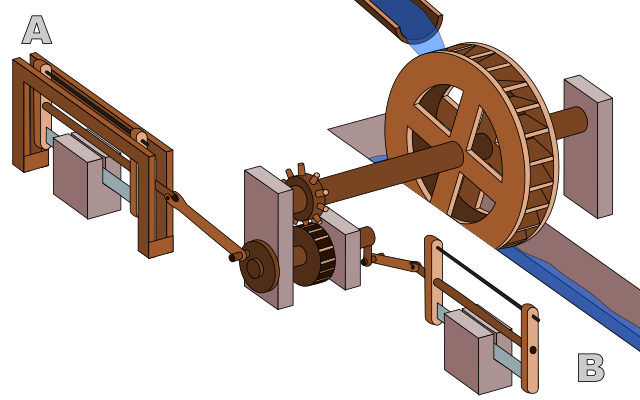Top Qs
Timeline
Chat
Perspective
List of ancient watermills
From Wikipedia, the free encyclopedia
Remove ads
This list of ancient watermills presents an overview of water-powered grain-mills and industrial mills in classical antiquity, including the Hellenistic period through the Roman period up until circa 500 AD.


The water wheel and watermill are the earliest instances of machines harnessing natural forces to replace human muscular labour (apart from the sail).[3] As such, it holds a special place in the history of technology and also in economic studies where it is associated with growth.[4]
The invention of the watermill is a question open to scholarly discussion,[5] but is generally agreed to have occurred in the ancient Near East,[5][6] either before[6] or during the Hellenistic period.[7] In the subsequent Roman period, the use of water-power was diversified and different types of watermills were introduced. These include all three variants of the vertical water wheel as well as the horizontal water wheel.[8] Apart from its main use in grinding flour, water-power was also applied to pounding grain,[9] crushing ore,[10] sawing stones[11] and possibly fulling and bellows for iron furnaces.[12]
An increased research interest has greatly improved our knowledge of Roman watermill sites in recent years. Numerous archaeological finds in the western half of the empire now complement the surviving documentary material from the eastern provinces; they demonstrate that the breakthrough of watermill technology occurred as early as the 1st century AD and was not delayed until the onset of the Middle Ages as previously thought.[13] The data shows a wide spread of grain-mills over most parts of the empire, with industrial mills also being in evidence in both halves.[14] Although the prevalence of grain-mills naturally meant that watermilling remained primarily a rural phenomenon, it began gaining importance in urban environments during late antiquity.[15]
The data below spans the period until circa 500 AD. The vast majority are dated to Roman times.
Remove ads
Earliest evidence
Summarize
Perspective
Below the earliest ancient evidence for different types of watermills and the use of water-power for various industrial processes. This list is continued for the early Middle Ages here.
- Undershot water wheel
- Breastshot water wheel
- Overshot water wheel
Remove ads
Written sources
Summarize
Perspective
In the following, literary, epigraphical and documentary sources referring to watermills and other water-driven machines are listed.
Remove ads
Graphical representations
This section deals with depictions of watermills which are preserved in ancient paintings, reliefs, mosaics, etc.
Archaeological finds
Summarize
Perspective
Watermill sites
Below are listed excavated or surveyed watermill sites dated to the ancient period.
Millstones
The following list comprises stray finds of ancient millstones. Note that there is no way to distinguish millstones driven by water-power from those powered by animals turning a capstan. Most, however, are assumed to derive from watermills.[101]
Water wheels and other components
Although more rare than the massive millstones, finds of wooden and iron parts of the mill machinery can also point to the existence of ancient watermills.[106] Large stone mortars have been found at many mines; their deformations suggest automated crushing mills worked by water wheels.[107]
Remove ads
References
Notes
Sources
Further reading
External links
Wikiwand - on
Seamless Wikipedia browsing. On steroids.
Remove ads



